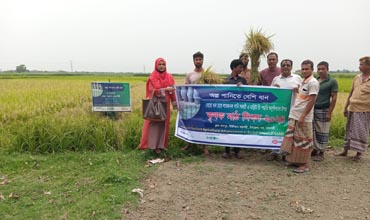
Climate resilient farming method being promoted in Barind area
Climate resilient farming method of Alternate Wetting and Drying-AWD is being promoted in the Barind area as it is being detected as drought-prone due to the adverse impact of climate change. During the current Boro-paddy season, AWD method was projected in 125 blocks in different parts of the region with intervention of a project. The grassroots farmers, deep-tube-well operators and others concerned were imparted training so that they can derive total benefits of the method. Besides, farmers field day was organized in eleven of the blocks assessing harvested paddy yield in terms of the AWD used field and the non-used field. As part of the programme, a field day was organized at Dadpur block under Borgachhi Union in Paba Upazila of the district today. Union Parishad Chairman Shahadat Hossain, Sub Assistant Agriculture Officer Anika Sarmin and Project Coordinator of DASCOH Foundation Aminul Islam were present at the field day and sample crop cutting ceremony. Muhammad Shamim, 45, a farmer of the Dadpur village, has got better yield from his AWD used land in comparison to the unused land. Expressing his happiness over adopting the method he said many of his fellow farmers are attaining additional benefits after using the method. Giving a salient feature of the method, he said it's a modern resilient and water-saving technology. It lessens irrigation cost worth Taka 800 to 1,000 for per bigha of land in addition to boost yield by three to five mounds of paddy. Deep-tube-well operator Foyzul Islam said AWD method helps save water in aquifers amidst an abnormal decline in the level of underground water in recent days. Elaborating aspects of the water-saving irrigation system he said the irrigation method should be promoted widely to protect the underground water from furthermore declining. DASCOH Foundation has been implementing a project titled "Climate Resilient Agricultural Advancement in Barind" in Paba upazila of Rajshahi, Sadar of Chapainawabganj and Niamotpur and Potnitola upazilas in Naogaon districts. Technically supported by the Syngenta Foundation and financially supported by the Hongkong and Shanghai Banking Corporation Limited, the project is intended to benefit 25,000 farmers in terms of climate-smart agriculture practices. In addition to the practice of climate-smart agriculture, the beneficiary farmers will gain capacity to boost irrigation efficiency and farm productivity. Local agro-business opportunities will be expanded to the farmers through connecting with a strong public-private stakeholder network. Akramul Haque, chief executive officer of DASCOH Foundation, said there is an urgent need of reducing installation of deep tube-well as per the National Water Policy-2018. Utmost emphasis should be given on innovation of new more agriculture technologies and expansion of those for continuation of rice production in the changed situation. Farhad Zamil, country director of Syngenta Foundation, mentioned that the expanded adoption of AWD irrigation method during Boro rice farming can save a minimum 30 percent irrigation water along with considerably increasing rice output. He said adoption of the simplest and lowest cost technology also helps farmers to adapt to scarcity of irrigation water. "Adoption of AWD technology with proper agronomic management reduces five numbers of irrigation saving 30 percent water, 30 litres diesel and electricity for irrigation to produce 500 kilograms more Boro paddy per hectare of land," he said. Farmers have already started reaping enormous benefits of AWD irrigation technology following massive motivational activities being conducted by various government and non-government organisations. Source: bssnews.net





